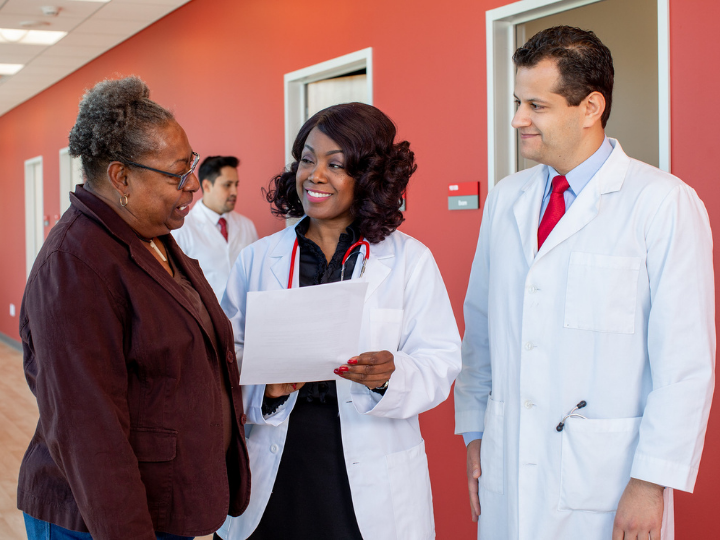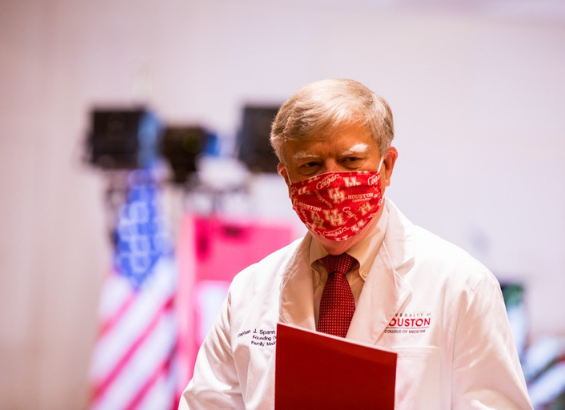

With a $1 million gift from The Cullen Trust for Health Care, the University of Houston College of Medicine (UHCOM) will open a low-cost direct primary care clinic on the campus of Memorial Herman Southwest Hospital, the first in a planned network of clinics aimed at increasing access to care for those without health insurance. The Greater Houston region has the highest rate of uninsured residents in the nation, a challenging issue that increases the overall costs of health care for everyone.
Direct primary care (DPC) is a relatively new method of delivering primary health care services in which patients pay a modest monthly membership fee for a broad, defined spectrum of services. While there is a growing number of DPC providers in Texas and around the country, few specifically target low income patients who don’t have access to health insurance coverage.
Approximately 25% of the Greater Houston population lacks health insurance, more than double the national average. The situation is even more stark among Hispanics as 50% of the Hispanic population of Greater Houston is without coverage.
University of Houston President Renu Khator says the new DPC clinic aligns with the goals of the University’s strategic plan to increase social responsibility initiatives by building equity and inclusion in the community.
“A direct primary care practice will add value to the local health care ecosystem by tackling one of the most pressing problems of our city: the lack of a comprehensive primary care system for the uninsured,” said Khator. “The Cullen Trust for Health Care shares our commitment to improving the overall health and health care of the population of Greater Houston and we are grateful for their support.”
The direct primary care model offers an alternative to insurance-based or fee-for-service practices commonly utilized in the U.S. by simplifying the health care system, alleviating the economic burden, and excluding third party payers.
Patients will have access to comprehensive primary care services, telehealth services, basic office procedures, at cost laboratory testing, as well as access to medications at reduced prices. Same-day or next-day appointments will be guaranteed.
“The UH College of Medicine wants to restore primary care as the foundation of health care. We have developed a model with strong incentives to innovate the delivery of primary care designed to improve quality and more effectively control the cost of care,” said Dr. Stephen Spann, founding dean of the UH College of Medicine. “We are building our model upon the four pillars of access, population health, social determinants of health and trusting relationships. In this framework, the physician is accountable for the health of their member panel and will demonstrate long-term cost and quality outcomes.”
Established in 1978, The Cullen Trust for Health Care grants financial assistance to institutions providing health care services in the Greater Houston area, with a vision to have an integrated health care system that provides the highest quality care to the greatest number of people.
“The Cullen Trust for Health Care is proud to support this pilot endeavoring to bring a new form of patient-centered primary care to Houston’s underserved communities. We are hopeful that the new UH College of Medicine direct primary care clinic will proactively engage patients to increase utilization and improve continuity of care,” said Cullen Geiselman, chairman of the board for The Cullen Trust for Health Care.
The clinic will be strategically located in Southwest Houston where nearly one in three people live below the federal poverty level. The uninsured rate in the Southwest area (45%) is five times higher than the nation (9%). It will be staffed by UHCOM faculty physicians and will also serve as a training site for UH health professions students. UHCOM hopes to establish a network of DPC practices in other communities of Greater Houston that have significant health disparities.
“Our model is based upon building relationships with our patients with a focus on empathy, evidence-based medicine, continuity of care and accessibility which is known to be associated with better health care outcomes,” said Dr. Omar Matuk-Villazon, director of the direct primary care clinic and UHCOM clinical assistant professor of pediatrics. “We aim to improve the health of our patients by addressing their social determinants of health and effectively managing their chronic conditions while avoiding unnecessary hospitalizations or emergency visits. Bottom line, our goal is to partner with our patients to improve their health.”
The UH College of Medicine was founded in 2020 on a social mission to improve health in underserved communities in Houston and across Texas. Earlier this year UHCOM became an official member of the Texas Medical Center, the largest medical center in the world. Its second class of 30 medical students began on July 26.
“This philanthropic support allows us to serve Houston in new ways, making it a healthier city for all. We are very grateful to The Cullen Trust for Health Care for its vision and generosity,” said Eloise Brice, vice president of university advancement.